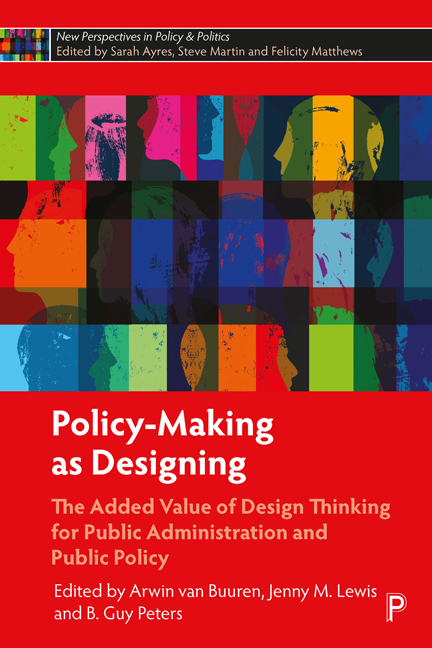 Policy-Making as Designing
Policy-Making as Designing Book contents
- Frontmatter
- Contents
- List of figures and tables
- Notes on contributors
- 1 Improving public policy and administration: exploring the potential of design
- 2 Applying design in public administration: a literature review to explore the state of the art
- 3 Challenges in applying design thinking to public policy: dealing with the varieties of policy formulation and their vicissitudes
- 4 Designing environments for experimentation, learning and innovation in public policy and governance
- 5 Policy Labs: the next frontier of policy design and evaluation?
- 6 When design meets power: design thinking, public sector innovation and the politics of policy-making
- 7 Designing institutions for designing policy
- 8 Applying design science in public policy and administration research
- 9 Using a design approach to create collaborative governance
- 10 Policy-making as designing: taking stock and looking forward
- Index
5 - Policy Labs: the next frontier of policy design and evaluation?
Published online by Cambridge University Press: 20 January 2024
- Frontmatter
- Contents
- List of figures and tables
- Notes on contributors
- 1 Improving public policy and administration: exploring the potential of design
- 2 Applying design in public administration: a literature review to explore the state of the art
- 3 Challenges in applying design thinking to public policy: dealing with the varieties of policy formulation and their vicissitudes
- 4 Designing environments for experimentation, learning and innovation in public policy and governance
- 5 Policy Labs: the next frontier of policy design and evaluation?
- 6 When design meets power: design thinking, public sector innovation and the politics of policy-making
- 7 Designing institutions for designing policy
- 8 Applying design science in public policy and administration research
- 9 Using a design approach to create collaborative governance
- 10 Policy-making as designing: taking stock and looking forward
- Index
Summary
Introduction
Policy labs have been emerging all over the world with a mission to support policy practitioners with innovative solutions, grounded in empirical research. This trend started less than a decade ago (Price, 2015; Tonurist et al, 2017), and a recent study has identified 78 policy labs in the European Union alone (Fuller and Lochard, 2016). While the idea of policy labs has gained considerable popularity, the term tends to be applied to different activities and approaches. This could be explained by the diverse strands that have provided methods for labs, such as design thinking, behavioural insights, collaborative governance and social entrepreneurship. This lack of a coherent typology of labs limits the possibility of comparing their operations and outcomes for academic and practical purposes.
The emerging practices of policy labs claim to bring promising innovations to the public sector. However, it remains unclear to what extent these varied practices provide truly new ways of addressing the challenges that have already been identified by existing public policy routines.
This chapter addresses the problem by looking at policy labs from the perspective of a well-established evaluation practice (Scriven, 1977; Chelimsky, 1985; Shaw et al, 2006; Newcomer et al, 2015). Evaluation has been systematically developing since the 1960s, accompanying subsequent waves of public programmes and becoming a standard of modern public management around the world (European Commission, 1995; OECD, 1998; Furubo et al, 2002; Jacob et al, 2015; Bohni et al, 2018). It has a dynamic worldwide community covering all policy fields, with numerous international, national and even regional associations across the world (for example, American Evaluation Association, European Evaluation Society, Australasian Evaluation Society) and its own highly respectable journals (for example, American Journal of Evaluation, Evaluation, Evaluation and Programme Planning). In order to underline the importance of evaluation practice for evidence-informed public policies and social betterment, the year 2015 was celebrated as an International Year of Evaluation (United Nations Evaluation Group, 2013).
Over the years, three broad challenges have emerged from global evaluation practice in relation to its contribution to public policies:
- Type
- Chapter
- Information
- Policy-Making as DesigningThe Added Value of Design Thinking for Public Administration and Public Policy, pp. 98 - 124Publisher: Bristol University PressPrint publication year: 2023


